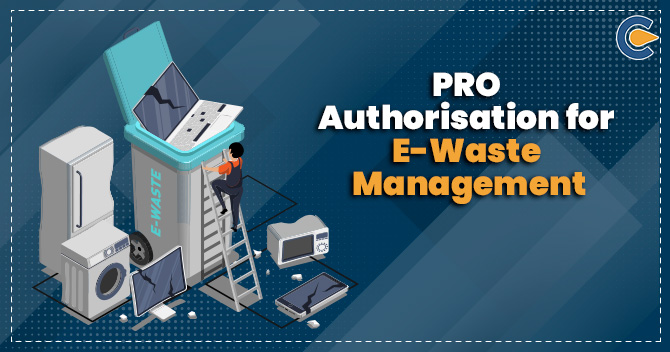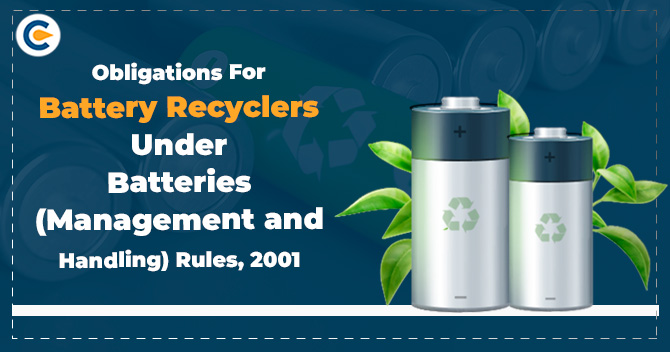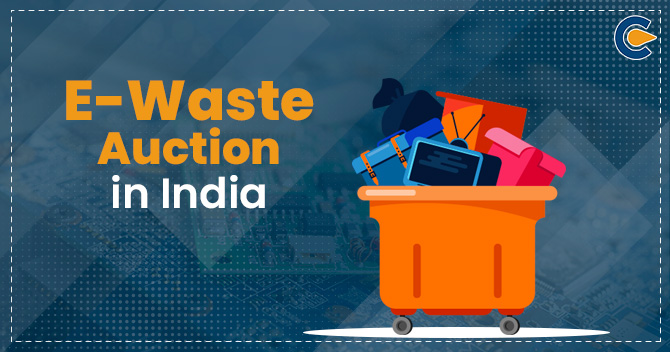PRO Authorization is an abbreviation for Producer Responsibility Organization, which is focused on end-of-life plastic goods management and recyclability in E-Waste Management. The manufacturer must follow the policies established by the Central Pollution Control Board. The excessive consumption of numerous complex durable products has resulted in serious environmental issues. Policymakers have been concerned about proper waste disposal. Officials recently implemented a regulation that holds makers of these commodities accountable for their detrimental handling. These manufacturers may also assign this responsibility of PRO Authorisation for E-Waste Management to a third party authorized by the Central Pollution Control Board. The Producer Responsibility Organization’s recommendations are based on Extended Producer Responsibility, which holds the maker accountable for the environmental effects of products throughout their life cycle.
Applicability of the Rule
Electrical and Electronic Equipment (EEE) producers have been given options in the E-Waste (M) Rules, 2016, to manage the producer responsibility (EPR) either individually/collectively through a producer responsibility organization (PRO) recognized by the producers in their EPR – Authorisation. A PRO shall apply to the Central Pollution Control Board for registration to execute the activities required for Producer Responsibility Organizations under these Rules, according to Rule 13 (1) (xvii) of the E-Waste (Management) Amendment Rules, 2018. In the definition of the PRO, the said rules regulated the actions to be carried out by the PRO.
PRO Definition
According to rule 3(dd), a ‘Producer Responsibility Organization’ (PRO) is a professional organization authorized or financed collectively or individually by producers to collect and channel e-waste generated from the ‘end-of-life’ or disposal of their products to ensure environmentally sound management of such waste.
Role of PRO
A PRO can only assist a producer or producers in satisfying their legal obligations if the producer (s) engage that PRO.
- E-waste collection and channelization on behalf of authorized manufacturers for environmentally appropriate waste management. Producers can hire PROs for single or many tasks related to EPR administration.
- PRO’s actions may comprise one or more of the duties listed below.
- Establishment of a collecting mechanism (door-to-door collection/collection campaign/e-waste exchange platform/individual procurement)
- Buyback/take back/DRS/e-waste exchange implementation
- Establishment of collection points/centres this may entail establishing collection or operating through warehouses following CPCB norms.
- Take back implementation
- Logistics planning
- Ensuring the traceability of collected and channelled e-waste
- Ensuring environmentally sound e-waste disposal and recycling
- Organize an awareness campaign among consumers/large consumers/producers on collecting and re-using e-waste.
- Assisting producers in filing quarterly/annual returns in accordance with the guidelines
Role of Producer in E-Waste management
The problem of minimizing E-waste is urgently needed in India by introducing effective E-Waste Management. Everyone must be aware and take responsibility to eliminate the pollution caused by e-waste. In addition, the government has begun to reduce e-waste output in India. As a result, they founded the Producers Responsibility Organization. The Producers Responsibility Organization’s role is to assist producers and meet their legal obligations in attaining the collection E-waste objective, introducing E-waste collection facilities, and conducting E-Waste Management awareness programmes.
PRO permission agreements must be executed between producers or with a producer association. The agreements must clarify the Producer Responsibility Organization’s role and responsibilities.
Role of Recycler in E-Waste Management
- Every individual proposing to recycle plastic waste must apply for registration with the State Pollution Control Board or the Pollution Control Committee to ensure environmentally friendly waste management and to facilitate adequate pollution control equipment to prevent environmental pollution.
- Every individual involved in recycling plastic waste shall arrange and submit an annual report to the local authority concerned by the 30th of April of each year, with notification to the concerned State Pollution Control Board or Pollution Control Committee.
- The Central Pollution Control Board has the authority to audit, substantiate, and scrutinize the application and decide accordingly.
Regulation of Producer Responsibility Organisation
The PRO’s responsibility is explained in two sectors as follows-
- Plastic Waste Management
- E-Waste Management
The E-Waste Management Rules, 2016, and the Plastic Waste Management Rules, 2016 hold producers liable for collecting plastic electronic product waste. Such producers must set up a strategy to manage the waste generated by their products.
In December 2020, the Prime Minister spoke about the benefits of fully utilizing electronics and carefully discarding outdated stuff. He also discussed the importance of effectively managing electronic trash. In August 2021, he introduced the ‘Garbage to Wealth’ programme, which focuses on repurposing waste.
Authorization and Recognition of PRO
The form to be submitted to the Central Pollution Control Board for registration of PRO is included with the directives for both plastic and electronic waste management for recognition and authorization of the Producer Responsibility Organization. The specifications for e-waste management do not specify any minimum requirements for PRO registration, whereas waste management guidelines provide the conditions listed below.
- Any Statutory Body registration,
- At least five years of waste management experience is required.
- Disclosure of successful municipal solid waste and plastic waste disposal,
- TAN, GST, and PAN information.
The CPCB[1] has the authority to scrutinize, verify, and examine the application before issuing the registration. Furthermore, the registration of the E-waste management guidelines will be valid for three years.
Capacity of PRO
A PRO should be able to channel e-waste to satisfy its producers’ collection targets. A PRO should explain its organizational structure regarding human resources, collecting facilities, and infrastructure for e-waste collection, storage, and transportation. A PRO should also state its capacity for processing e-waste, which includes collecting, storage, and transportation capacity, as well as the capacity of its dismantler and recycler with whom it has an agreement for e-waste dismantling and recycling. PRO should offer information about its collection system and should be able to conduct an awareness campaign to educate consumers about its channelization schemes and collecting mechanisms via print/visual/display media.
Step involved in PRO Registration
Step 1: A PRO Using the form supplied under the act is to apply for registration with the Central Pollution Control Board.
Step 2: CPCB will then evaluate the capability and capacity to undertake e-waste collection, storage, transportation, dismantling, recycling, and carrying out awareness programmes for e-waste channelization upon receipt of a comprehensive application.
Step 3: The CPCB verifies the applications and responds with a checklist within 25 days of receipt. The concerned authority at CPCB will issue a letter along with a list of deficiencies.
Step 4: The Member Secretary of the CPCB shall be the appropriate authority to approve the PRO’s registration.
Step 5: CPCB shall award registration to the PRO within 60 days of receipt of the completed application if it is satisfied with its capability and capacity.
Note: A renewal application must be submitted within 60 days of the registration’s expiration date.
Cancellation/suspension of registration
If a PRO fails to comply with any of the registration conditions or any sections of the E(P) Act, 1986 or E-waste (Management) Rules, 2016 or amendments thereof during the registration period, CPCB may cancel or suspend the registration. If a PRO is found to be in violation of a registration clause during random CPCB/SPCB checking, the CPCB/SPCBs may issue a notice within 25 days of such verification/checking.
Before a PRO’s registration is cancelled or suspended, the PRO will be given the option to appear before the Member Secretary of the CPCB, who will approve the cancellation or suspension of the PRO’s registration. The registration cancellation or suspension decision will be communicated within 10 days following the hearing.
Appeal
Any PRO aggrieved with an order of cancellation or suspension of registration issued by the Member Secretary, CPCB, may appeal to the Chairman CPCB within thirty days after receiving the order, whose decision is final.
Conclusion
Reducing E-waste in India is crucial, and everyone should be aware of the issue and commit to eradicating pollution caused by e-waste. The Indian government has attempted to limit the amount of e-waste produced by E-Waste Management. As a result, PRO was created (Producers Responsibility Organization). The role of PRO is to assist producers in meeting their legal obligations by aiding them in meeting E-waste collection targets, constructing E-waste collection facilities, and implementing E-waste collection awareness programmes. The government’s Producer Responsibility Organization project is a practical step in the waste management process. PRO’s success, however, is dependent on upper management. The authority must have a sufficient regulatory framework emphasizing the involvement of various stakeholders and acceptable producer rules.
Read Our Article: How To Start An E-Waste Management Business In India?











